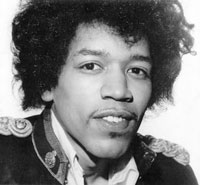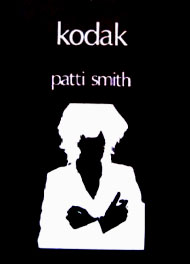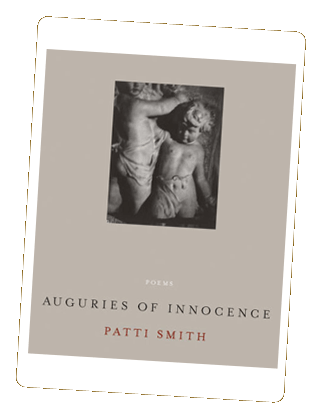 |

|
an
interview with page nine TODD BAESEN: Here's a picture of you on stage with a friend of yours.
PATTI SMITH: Oh, wow, I've never seen this picture of Bob Dylan. TODD BAESEN: Actually I was rather disappointed in Michael Stipe's photo book of the Dylan tour, because there are no pictures of you with Bob Dylan in it. PATTI SMITH: That's because we weren't allowed to take any pictures. His people took some, but Bob told us not to take any and we weren't about to disobey him. TODD BAESEN: Here's a copy of your Horses songbook. PATTI SMITH: That was a nice limited edition music book that we put out. TODD
BAESEN: Elegie, the last song on Horses was written in memory of Jimi Hendrix,
and there was recently a major show of Jimi Hendrix photographs in San Francisco,
so I think it would be appropriate to include your souvenance for Jimi Henrix
here:
TODD BAESEN: Did you ever meet Jimi Hendrix? PATTI SMITH: Yes, I was fortunate enough to have had a little discussion with Jimi Hendrix on the steps of Electric Lady studio. It happened when he was leaving a big party for the opening of his studio. I had been invited to the party, but I was too shy to go in, because it was my first rock and roll party. I didn't really know what to do, so I just sat on the steps. And suddenly out came Jimi Hendrix. He was on his way to the Isle of Wight festival and I got to see him leave. He asked me what I was doing sitting there and said, 'Hey, I'm kind of shy too.' So we sat on the steps and he talked about his vision of the studio and what he wanted to do when he came back from London. He said he wanted to create a new language with musicians from all over the world; to create an atmosphere where at first there might be a cacophony because of all their different approaches, but by playing together after some months they would find some common thread. So he had great visions for the studio, but then he was gone. He never came back. So I felt we were very privileged to record Horses at Electric Lady, but I don't think we were exactly what he had in mind. But it was so exciting and so wonderful to go into that studio and be able to do a body of work there. I also had to learn a lot of new stuff, like how to improvise in a vocal booth, which was kind of scary. Also, at that time you had to mix by hand, and I had done nine different poems to put on Land so we had to write down all the words on long strips of paper and then (producer) John Cale, Lenny and I, we all had to have a couple of faders and bring them up and pull them down at different times. So I had all these little cryptic notes, like when it says "Tower of Babel," you have to bring up, "build it, build it, build it." It was pretty exciting. I remember we also had to record Redondo Beach at four in the morning, because that was the only time available, and I lived nearby on MacDougal street and Lenny had to come by and wake me up when we all went into the studio to record Redondo Beach. That was driving John Cale so crazy, that he finally started banging his head against the speakers. Luckily it was at the end of the record. TODD BAESEN: Speaking of Redondo Beach here's a copy of the poem version of that song, which you included in your early chapbook, Kodak.
PATTI SMITH: Oh, that's really interesting. I haven't seen that in a real long time, so I'm very curious to read it. Of course, Redondo Beach found it's way to becoming a song on Horses. You know somebody just brought a copy of Kodak for a ridiculous amount of money. I don't know how much, but it was a lot of money. TODD BAESEN: My friend Andrew tells me it sold for $2,685! At that price maybe you should reissue Kodak yourself. Now, here's a copy of the original Easter promo poster, with your tag line, "Death is a dance / a ballroom / a glove. An extension of total abandon in love." PATTI SMITH: That's when I used to write my own ad copy. KARL: Do you now regret saying you picked the Easter cover shot to encourage teenagers to masturbate? PATTI SMITH: No, I don't think about that. KARL:
Wasn't that your comment at the time though? PATTI SMITH: Well, I was just being... really I wasn't trying to do anything. What I was doing was just putting a bobby pin in my hair. TODD BAESEN: Supposedly your underarm hair in the picture cost you sales of about 50,000 albums. PATTI SMITH: Yeah it did. Maybe more. They thought more like 100,000 copies, because the album was pulled from many stores, but I am not a career person and I have always made my own decisions. BARRIE DURYEA: I'm surprised they didn't try to airbrush your armpit hair out. PATTI SMITH: They did try, but I refused to let them do it, because in my record contract I had final approval. They airbrushed my hair on the Horses cover. I looked at it and they had smoothed it down, and I flipped out! They made it real smooth, like a helmet, as well as eliminating my facial hair. They lightened my upper lip and they made my hair all smooth so it looked like a cutout. In those days, that was considered really messy. You wouldn't believe the bullshit I had to put up with over that cover, and it's such a nice cover. CHRIS: In 1984 I taught a course called California poets, and I used to use your book Babel as an inspiration for the kids and they loved it. PATTI SMITH: That's a little bit hardcore... TODD BAESEN: Is Jesse going to be playing keyboards when you play at the Great American Music Hall Monday night? PATTI SMITH: She might. But I don't want it to be predictable. TODD BAESEN: You know one of the best shows I've ever seen you do was in 2003 when you played The Great American Music Hall on the Land tour. There was a full moon out that night, and you didn't play any acoustic songs, so it was really a tight and energized set. PATTI SMITH: Yeah, it just sort of flowed along, but we'll probably be playing all acoustic songs tomorrow night. Although Lenny did bring along one electric guitar, but that's all. Barrie is going to play some bass guitar, too. TODD BAESEN: I see that Complete has now been updated to include all the lyrics from Trampin', as well as a song you forgot to include in the previous editions, It Takes Time. PATTI SMITH: Yes, Ecco/Harper Collins is re-releasing Complete, so now it will finally be completed. It will have a few more pictures and a few more records. TODD BAESEN: To end our talk, I'd like to quote the last paragraph of the essay you wrote for Annie Leibovitz's wonderful book of photos, American Music: PATTI SMITH: We
must be vigilant. We must be citizen soldiers, stripped of fear. Our optimism
is magnified in our music. We are all Walt Whitman. We sing of ourselves. The
songs we create, which address our own condition, will ultimately sing of another.
And another.
|
|




